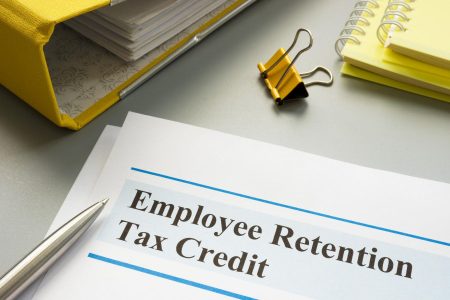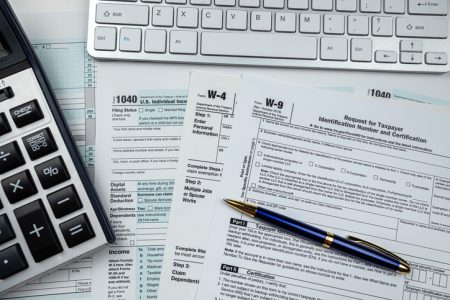Many questions intrigue economists and policymakers. Right now, one question is being debated more than most: Can tariffs replace income tax? This concept refers back to early American fiscal policy. Before the institution of the income tax, tariffs were the federal government’s primary revenue source. Could this be feasible again? The idea suggests that large duties on imported goods could potentially generate enough revenue to replace income taxes. While this proposition might appeal to those seeking relief from annual tax filings, the economic reality is far more complex.
Does Trump Want to Replace Income Tax With Tariffs?
President Donald Trump has indicated a desire to replace federal income taxes with revenue generated from tariffs. In April 2025, he announced a 10% universal tariff on all imports, effective April 5, 2025, citing the need to address the national emergency posed by the large and persistent trade deficit.
“We’re going to make a lot of money, and we’re going to cut taxes for the people of this country,” Trump told reporters on April 27. “It’ll take a little while before we do that, but we’re going to be cutting taxes, and it’s possible we’ll do a complete tax cut, because I think the tariffs will be enough to cut all of the income tax.”
He has also suggested the creation of an “External Revenue Service” to collect tariff income, potentially replacing the Internal Revenue Service’s role in collecting income taxes.
Trump’s proposal draws inspiration from the 19th-century U.S. economy, which was primarily funded by tariffs before the establishment of the federal income tax in 1913. He has stated, “We were at our richest from 1870 to 1913. That’s when we were a tariff country.”
Why Tariffs Can’t Completely Replace Income Tax
Tariffs alone cannot generate enough revenue to fully replace the income tax system. In 2024, individual income taxes brought in approximately $2.4 trillion to the federal government. This represented nearly half of all federal revenue. By comparison, even aggressive tariff policies would likely generate only a fraction of this amount, creating an enormous budget deficit.
Replacing income taxes with tariffs would significantly distort economic activity. Tariffs primarily affect imported goods, essentially functioning as a tax on specific products rather than a broad-based revenue source. This narrow focus would create uneven economic impacts across different industries. Sectors that rely on imported materials or components would be hit disproportionately hard.
Is it possible for tariffs to replace income taxes without raising consumer prices? Unfortunately, no. Higher tariffs would inevitably lead to increased prices on imported goods as businesses pass these costs to consumers. This creates a regressive tax effect, as lower-income households would spend a larger percentage of their income on goods, bearing a heavier burden than wealthier Americans.
A tariff-based revenue system would dramatically alter international trade relationships. Trading partners would likely respond with retaliatory tariffs on American exports, potentially triggering trade wars. Such conflicts could severely damage American businesses that rely on export markets. It could also disrupt the global supply chains American consumers depend on most.
How Tariffs Work
Tariffs are essentially taxes imposed on imported goods and services. When a country implements tariffs, it requires importers to pay these fees when bringing foreign products across its borders. The primary purpose of tariffs is to make imported goods more expensive, which can protect domestic industries from foreign competition.
Customs authorities determine import duties using various methods. One common approach is the ad valorem tariff, which calculates the duty as a percentage of the product’s declared value. Alternatively, specific tariffs impose a fixed fee based on measurable units, such as weight or quantity. In some cases, a combination of both methods—known as compound tariffs—is applied. Importers are responsible for paying these duties upon entry of goods into the country. However, these additional costs are often transferred to consumers through increased retail prices.
Tariffs create a ripple effect throughout the economy. Domestic producers may benefit from reduced foreign competition, potentially preserving local jobs and industries. However, consumers typically face higher prices for both imported goods and similar domestic products. This price increase occurs because tariffs not only make foreign goods more expensive but also allow domestic producers to raise their prices due to decreased competition.
What Income Could Become Tax Free?

If tariffs were to replace income taxes, your wages and salary could potentially become completely tax-free. Currently, most Americans see a significant portion of their paychecks withheld for federal income taxes before the money even reaches their bank accounts. A shift to a tariff-based system might eliminate these withholdings, allowing workers to keep their full earnings from employment.
Capital gains, dividends and interest income might also escape taxation under a tariff-focused revenue system. These investment returns, which currently face various tax rates depending on income level and holding period, could become more lucrative if freed from tax obligations. This change could potentially encourage more Americans to invest and save for their futures without tax considerations influencing their decisions.
If tariffs fail to replace income taxes, Americans might increasingly turn to Roth accounts for tax-free income in retirement. Roth IRAs and Roth 401(k)s differ from traditional retirement accounts in that they’re funded with after-tax contributions, grow without tax liability, and offer tax-free withdrawals during retirement.
Municipal bond interest would likely remain tax-free at the federal level even if tariffs don’t replace income taxes. These bonds, issued by state and local governments to fund public projects, have historically provided investors with income that’s exempt from federal taxes. For residents of the issuing state, this income is often exempt from state taxes as well, creating a double tax advantage for conservative investors seeking predictable income.
Bottom Line

While the idea of replacing income taxes with tariffs might seem appealing to some, economic reality suggests this approach could create significant challenges. Tariffs primarily serve as trade policy tools rather than reliable revenue generators. History has shown that heavy reliance on tariffs can trigger trade wars, increase consumer costs, and disrupt global supply chains. While tariffs can certainly play a role in a nation’s revenue strategy and trade policy, completely replacing income taxes with tariffs remains impractical in today’s interconnected global economy.
Tax Planning Tips
- A financial advisor can help you explore opportunities for tax savings throughout the year. Finding a financial advisor doesn’t have to be hard. SmartAsset’s free tool matches you with vetted financial advisors who serve your area, and you can have a free introductory call with your advisor matches to decide which one you feel is right for you. If you’re ready to find an advisor who can help you achieve your financial goals, get started now.
- Selling underperforming investments at a loss can offset gains elsewhere in your portfolio. This strategy, known as tax-loss harvesting, can help manage capital gains taxes and improve after-tax returns.
Photo credit: ©iStock.com/wildpixel, ©iStock.com/wildpixel, ©iStock.com/Thapana Onphalai
Read the full article here









